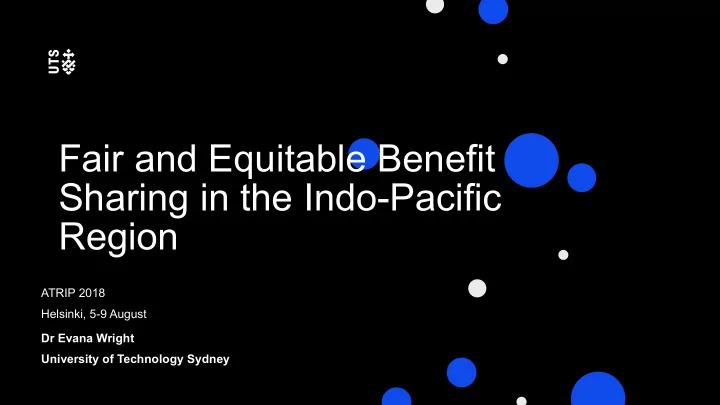

Fair and Equitable Benefit Sharing in the Indo-Pacific Region ATRIP 2018 Helsinki, 5-9 August Dr Evana Wright University of Technology Sydney
2 Fair and Equitable Benefit Sharing in the Indo-Pacific Region Nagoya Protocol on Access to Genetic Resources and the Fair and Equitable Sharing of Benefits Arising out of their Utilisation • Established under the Convention on Biological Diversity (CBD) • Address the 3 rd objective of the CBD – ensure the ‘fair and equitable sharing of the benefits arising out of the utilisation of genetic resources’ (Article 1) • Article 5 – Fair and Equitable Benefit Sharing • Article 7 – Access to Traditional Knowledge Associated with Genetic Resources • Annex – Monetary and Non-Monetary Benefits
3 Fair and Equitable Benefit Sharing in the Indo-Pacific Region Fair and Equitable Benefit Sharing under the Nagoya Protocol - Annex Monetary Benefits Non-Monetary Benefits Access fees/fee per sample collected Sharing of R&D results Up-front and/or milestone payments Collaboration, cooperation and contribution in R&D including research directed to priority needs Royalties Participation in product development Licence fees Education and training Special fees to be paid to trust funds supporting Knowledge and technology transfer under fair and conservation and sustainable use of biodiversity most favourable terms Salaries and preferential terms Capacity building Research funding Contributions to local economy Joint ventures Institutional and professional relationships Joint ownership of IP rights Food and livelihood security benefits Social recognition Joint ownership of IP rights
4 Fair and Equitable Benefit Sharing in the Indo-Pacific Region Benefit Sharing in the Pacific o Samoa – the case of Mamala o Vanuatu – the case of the Santo expedition o Australia – the case of mudjala
5 Fair and Equitable Benefit Sharing in the Indo-Pacific Region Benefit Sharing in India – Biological Diversity Act 2002
6 Fair and Equitable Benefit Sharing in the Indo-Pacific Region What is ‘fair’ in fair and equitable benefit sharing? o What constitutes ‘fair and equitable’ benefits will differ on a case by case basis and will depend on the parties involved (community/government/user party) o Balance between monetary and non-monetary benefits o Delivering on benefit sharing arrangements is difficult to monitor and enforce particularly taking into account cross jurisdiction enforcement o Without addressing the issues associated with ensuring fair and equitable benefit sharing run the risk of creating pure ‘access regimes’ and failing to deliver on the third objective of the Convention on Biological Diversity and requirements under the Nagoya Protocol.
Thank you
Recommend
More recommend